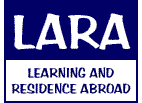

When Melissa applied to study Politics and Russian at university, she didn't really realise just what it would entail. But after a short while it sank in that that this would mean spending a compulsory year in Russia - one of the coldest countries in the world - with juvenile chronic arthritis.
I spoke to my department, and learnt that I could be exempt from the year on health grounds, but my tutor advised that if I really wanted to speak Russian the best place to be was in the country. It took me a long time to decide definitely to go, but after receiving positive advice from many people who had been in Russia I made up my mind. I was going.
My university sends students to Russia using an organisation which arranges visas, flights, accommodation and the 9-month language course. The organisation was not overjoyed to hear a student with arthritis wanted to go to St Petersburg. Understandable perhaps, Russia is not the easiest place to live, but it's a shame that people do not appreciate enough that students with special needs are normal, too! Eventually a student who had just come back from St Petersburg told me that the hostel where students live was in the same building as the teaching block. This meant I wouldn't even have to go outside in the morning (when I'm most stiff) to get to my classes! Knowing this really helped; the organisation agreed, and everything was sorted out. I was away!
When I got to Russia I found the staff at the university really helpful. I can walk, but not very far without getting sore, so they showed me the best bus routes to cut down the walking, and even pushed my wheelchair once! Despite the fact that during the winter the weather is cold and there's lots of snow, it was actually not too difficult to get around the city. Because few Russians have cars there is a well developed, if ageing, public transport system, and the underground goes all over the place. Once I had mastered this I was okay. Whereas in Britain I would have to walk down the street - in St Petersburg I could jump on a bus, trolleybus or tram and ride down the road! I soon made Russian friends and they carried my bag and helped me around too.
I got a grant from the Student's Awards Agency for my trip to cover extras like transport (taxis when I needed them etc.); laundry costs (a 'babushka' (old lady) used to whisk my clothes away every week as there was no washing machine in the hostel), and cleaning too; things I find hard as my hands are weak. This support was invaluable.
I cannot describe what a brilliant time I had during my 9 months away. I went along to a Christian student group and I got involved in a church there. I did some voluntary work with street kids too. All these experiences meant that I made many really good friends who I still keep in touch with. This in itself has been the best experience for me; meeting Russians in their own country and learning about their history, culture, language and lifestyle first-hand.
I have many treasured memories; spending 40 fascinating hours on an old-fashioned Russian train going on a trip across some of the vast country; buying ice-cream to warm you up' when it is minus 10 outside (it works - honest!); drinking tea with jam in it - a Russian tradition, and walking across a lake when it was frozen over! There were undoubtedly challenges, too, in just getting around and daily living, but I coped with these in much the same way as I would in Britain - by planning the best way to do things and not being afraid to ask for help.
My tutor was right, my Russian is better since being away! If you are studying languages or get the chance to go abroad while on another course, and you have a special need, don't let it stop you. Ask lots of questions about all aspects of life out there before you go, talk with the relevant people, especially those who have been before, and you may find there won't be as many difficulties as you had thought. Studying abroad is a fantastic experience, and I wouldn't have forgone it for anything.